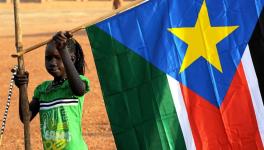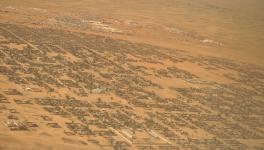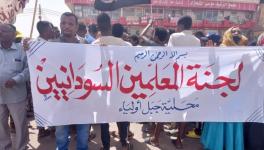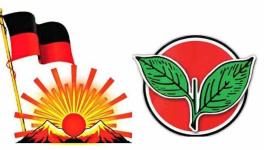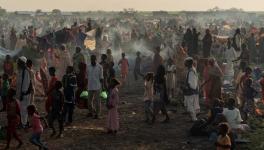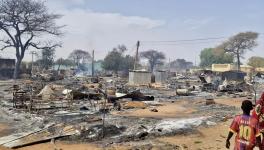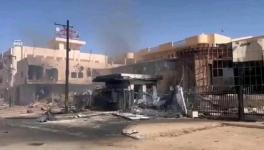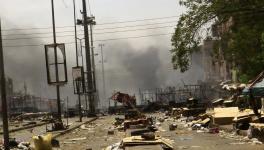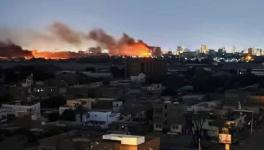Thousands Take to the Streets in Sudan, Demand Civilian Govt, End to Armed Conflict
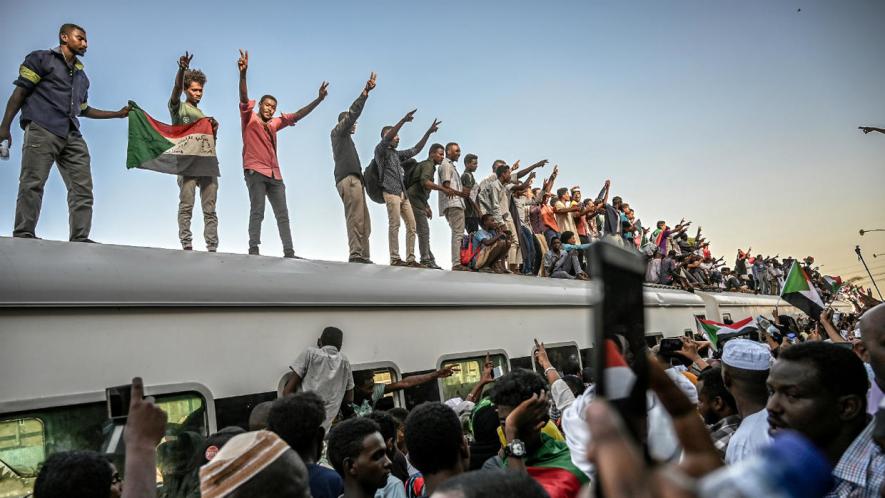
Sudanese protesters atop a train on April 23, 2019 days after Omar al-Bashir was forced to step down. Photo: Ozan Kose / AFP
Thousands of protesters took to the streets in Sudan’s capital Khartoum on Wednesday, December 25, to mark the anniversary of the massive march led by the Sudanese Professionals’ Association (SPA) last year. The march had sought the removal of Omar al-Bashir from the presidency, which he had captured through a coup in 1989.
The SPA is an umbrella body formed with the backing of the Sudanese Communist Party (SCP) by uniting the trade unions banned under al-Bashir’s regime. The SPA was vital in ensuring that the protests that had broken out spontaneously on December 19 due to the rise in bread prices took an organized and sustained form. It soon went on to become the leading voice in the demonstrations that lasted till April when al-Bashir was overthrown.
Following this, after a military junta assumed power, the organization was in the forefront again, directing the demonstrations which finally forced the junta to make way for a civilian-dominated transitional government.
On Wednesday, marking the anniversary, thousands of protesters marched to the presidential palace and the cabinet of the transitional government, demanding the completion of the goals of the revolution. These include a complete civilian government, resolution of the economic crisis, and most importantly, a peace agreement to end the civil war between the state and armed rebel groups.
Negotiations to end the armed conflict began soon after the civilian-majority transitional government was formed in August. Currently, the peace negotiations that have been ongoing in South Sudan’s capital city of Juba have come to a halt. They will resume in the first week of January.
According to Radio Dabanga, a delegate from the negotiating team, and a civilian member of the sovereignty council ( the highest body of the transitional government), Mohamed El Taayshi, said at a press conference while returning from Juba to Khartoum, “We have come close to a framework agreement on the Darfur track.”
The negotiations have been complex due to the difficulties involved in negotiating with the multiple armed factions fighting in Darfur, where a genocide was committed under al-Bashir’s rule. An additional difficulty had arisen because a significant section of the Internally Displaced Persons (IDPs) and refugees from the conflict did not feel that their interests were being represented by any of the negotiating parties.
On December 23, the government and the Sudanese Revolutionary Front (SRF) – an umbrella of armed groups fighting the government in different regions of the country – reached an agreement to address this concern.
As per the agreement, Sudan Tribune reported, a joint committee consisting of eight members from the government and 16 from the SRF will oversee the process of identifying and choosing representatives from “within the IDPs camps and settlements in Darfur.”
Engaging the IDPs and refugees
About 200 representatives, including 100 women, will participate in a consultative conference on January 10, 2020, which will be held in North Darfur’s capital city of El Fasher.
These representatives will choose 50 from amongst them – 25 men and 25 women – who will travel to Juba, from where they will select four men and four women as observers in the negotiations regarding the issues concerning the IDPs.
A similar arrangement had been made to accommodate the concerns of the refugees who had been forced to flee the country due to conflict. 20 of their representatives will be selected to attend the Juba process from camps in Niger, Chad and Central Africa.
“The IDPs and refugees will refuse the peace agreement if their representation was manipulated. So, we want them to come from within the camps and bring with them their real issues and claims,” said SRF leader, Hadi Idriss, according to Sudan Tribune.
Previously, on December 16, two armed groups active in the Darfur region – the Minni Minnawi-led faction of Sudan Liberation Movement (SLM) and Bakheit Dabajo-led faction of Justice and Equality Movement (JEM) – had signed an agreement to coordinate their activities and eventually unify the movement, which considerably simplifies the peace process.
However, the SLM faction led by Abdel Wahid Mohamed al-Nur has refused to take part in the Juba peace process. Calling the power-sharing agreement between the military and civilian forces which led to the formation of the transitional government a betrayal of the revolution, al-Nur called for the formation of a civilian government which has no interference from military generals who share high positions within it.
Speaking over Skype at this event, which was also attended by the prime minister, he also insisted on the handing over of Bashir to the International Criminal Court (ICC), which has found him guilty of genocide, war crimes and crimes against humanity.
Get the latest reports & analysis with people's perspective on Protests, movements & deep analytical videos, discussions of the current affairs in your Telegram app. Subscribe to NewsClick's Telegram channel & get Real-Time updates on stories, as they get published on our website.









